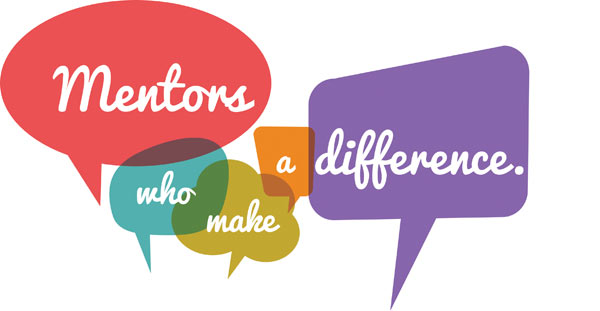
The term “golden years” means different things to different people. For some, becoming a senior citizen offers the long-awaited opportunity to travel and pursue new experiences, extra time to indulge in hobbies and favorite activities.
Some relish the chance to retire and leave behind a structured schedule. Others see no reason to stop working at a career they love, especially when it’s one they find satisfying.
Among the happiest seniors are those who have found a way to reach out and impact others. According to nationalservice.gov, 1.5 million of America’s volunteers engage in youth mentoring activities through an organization. Whether it’s mentoring a student or filling the shoes of a missing parent, these individuals are making a powerful and permanent difference in the lives of young people in our community.
Read on to discover their remarkable stories and learn how you, too, can get involved.
Frank Armatti
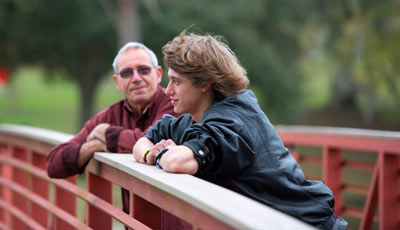
“I will always stand behind him to help steer him in the right direction.”
“Raising my daughters was the best part of my life,” says Frank Armatti, 61, who loved being an involved father.
“I was reaching a point where my daughters were growing up, and it was my oldest daughter who actually said, ‘Why don’t you be a Big Brother? There’s a lot of kids out there who could use your help,’” recalls Frank, who was born and raised in New York City but has lived in Ocala over 30 years.
Intrigued, Frank contacted Big Brothers Big Sisters of Mid-Florida, went through the screening process and became a volunteer/mentor. The organization refers to the volunteers as “bigs” and the children they’re matched with as “littles.” One of the unique things about the program is that it’s strictly one on one and always same sex. There’s a minimum one-year commitment, but a big-little match can stay together longer if they both like. Frank and his “little” have been a match since he signed up in 2008. When they were first paired, Nicholas was 11.
“He was very shy. The first thing I told him was that I was there to teach him to play chess,” says Frank, who happens to be president of the Ocala Chess Club.
Over time, with constant effort and caring, Frank gained the boy’s confidence. Frank participated in school activities, fundraisers and tutored Nicholas; he took his “little” to Gator football and basketball games, Silver Springs’ concerts, played sports with him, bought season passes so they could spent a lot of time at Wild Waters in the summers, spent Christmases together and even paid for extensive dental work Nicholas needed.
“Big Brothers Big Sisters doesn’t expect you to really do much out of pocket, but I saw his needs and wanted to help,” says Frank.
“He was a challenge at first, but he started opening up to me, which made me feel good. Every time we got together, it was better and better. He’s done a lot of ‘firsts’ with me; we’re very close. Now, he’s a young man doing well and going in the right direction. He’s a very sharp kid and hard-working. It’s very rewarding for me; it’s filled a big vacancy in my life as my daughters were marrying and moving away,” adds Frank, who puts in an average 20 to 24 hours a month in person, plus a lot of time on the phone talking with his “little.”
Nicholas is currently taking culinary classes through Job Corps (a no-cost education and vocational training program administered by the U.S. Department of Labor that helps young people ages 16 through 24 with vocational and academic training) and hopes to pursue a career in that field.
“When we met, he was 11; now he’s 17 and stands a foot taller than I do,” laughs Frank.
Although the organization only matches youth through age 18, Frank has no doubt he and Nicholas have a lifelong friendship.
“I’ll stay in touch with him forever; it’s beyond Big Brothers Big Sisters. I will always stand behind him to help steer him in the right direction,” says Frank. “I’m so proud of him and what we’ve accomplished.”
Manny Brett
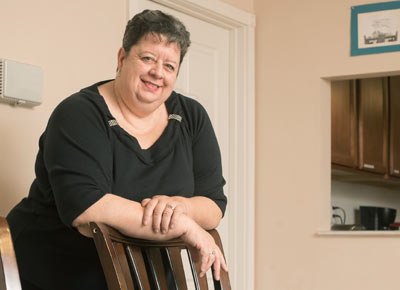
“We can’t win them all, but when you make a difference in a boy’s life, it’s awesome.”
As supervisor of the Arnette House Group Home for Boys, Manuela (“Manny”) Brett, 57, does her best to make the atmosphere as home-like as possible. After all, she may be the only “mother figure” in some of the boys’ lives.
“We have staff on hand 24/7, and there are several of us, so we all take the role of ‘Mom.’ We serve as mentor, disciplinarian, pretty much everything a mom would be. Each boy can gravitate to the person who fits them best. This gives them a way to talk and get things off their chest,” explains Manny. “We try to run it like a home, not a shelter.”
Arnette House Group Home for Boys, through a partnership with Silver River Mentoring and Instruction, is a non-profit agency that receives much of its funding through the caring generosity of the community, so donations of any amount are always welcome. (Donations must be marked “Boys Group Home.”) Boys in need, ranging in age from 12 to 18, come to the home through various agencies and can stay until age 18 when they’re considered adults. There are never more than six boys at a time. Every boy’s story is different, but it’s a misconception that they are sent to the home because of bad behavior.
Manny was drawn to the work because of her love for children.
The mother of four grown children (one of her boys works at the Arnette House Emergency Shelter, which offers short-term placement for children in need) and four grandchildren, Manny began working for Arnette House in 2005 and has been at the Group Home for Boys since last May.
“When my one grandson was born premature and ended up in a wheelchair, I wanted to be part of making a difference in children’s lives,” says Manny. “We were living in Huntsville, Alabama, at the time and raising our children. My husband and I decided to take in foster children. We took teenagers with behavioral issues because everybody wanted to take the young kids. I knew some children fall through the cracks because they are less than perfect physically and emotionally. After we moved to Florida in 2004, I decided not to do foster care anymore because I just wanted to keep all of the kids. I didn’t want to say good-bye.”
When the Brett family moved to Ocala in 2004, Manny was driving through town one day when she saw a sign for Arnette House. Intrigued, she found out more and then applied to work there. She was hired a short time later and has been making a difference there ever since.
Manny can recall many individual stories that have touched her heart since coming to Arnette House. She tells of one boy in particular who came to the group home at age 17.
“He had trouble with substance abuse and had dropped out of school. He only had five months until he turned 18 and ‘aged out’ of the home, but he did a 180 in that time. We helped him get off the drugs and took him to the Drop-Back-In program, which helps kids get a high school diploma after they’ve dropped out. He became a model student there. I got a call from his mom after Christmas; he’s still in school and doing great,” says Manny.
“We can’t win them all, but when you make a difference in a boy’s life, it’s awesome.”
Barbara Milton
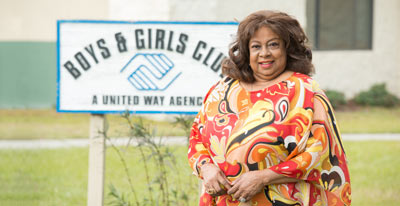
“Some of these children don’t even know the alphabet at age 7, so we start there.”
When a child has trouble reading, it impacts every aspect of life.
“There are so many children who can’t read or spell and it breaks my heart,” says Barbara Milton, a senior citizen and native of New York who moved to Ocala in 1999.
Before retiring, Barbara owned an optical facility for 20 years before deciding to teach preschool for 15 years. She was even honored with the esteemed JOEY Award for saving a child’s life. The mother of one grown daughter, Barbara has two granddaughters, both of whom are classical pianists who write and compose music promoting self-esteem and autonomy in young people.
“I moved here because of them, and when they moved to Miami because of my son-in-law’s business, I thought, What am I going to do?” recalls Barbara. “I have a passion for children and wanted to do something that has meaning, so I thought it would be a good idea to volunteer at the Boys & Girls Club. I just fell in love with it and feel like I’m doing something worthwhile.”
Since 2010, she has spent her free time volunteering at the Boys & Girls Club, sometimes spending extensive hours with projects and new learning ideas.
The Boys & Girls Club offers a safe, supervised atmosphere where kids ages 6 to 18 participate in youth programs and activities. The goal is to connect young people with caring, responsible adults in a positive atmosphere where kids can learn, grow, feel empowered and develop life skills while having fun.
Barbara works with children ages 5 to 7 from all different ethnic backgrounds, helping them with reading, spelling and vocabulary words. She even created an area where kids who want to learn Spanish can practice counting and learn basics like the months of the year, days of the week and colors.
“The time to start is in the early years. Some of these children don’t even know the alphabet at age 7, so we start there,” she says. “It’s sad that some children go from one grade to another without being able to read. Some have a learning disability, but for others, it’s just that no one has taken the time to teach and work with them.
“Some kids act out when they’re frustrated and embarrassed because they just don’t ‘get it.’ Now, these kids come to me, and they know I’m there to help them,” Barbara notes. “You should see the expression on their faces when they realize they can do it!”
Although reading and spelling are crucial for a child’s future, Barbara also works with “her” kids to help instill good manners and respect. She’s found that once a child knows someone really cares, that young person wants to please.
Barbara also enjoys arts and crafts time with the children and appreciates their enthusiasm when she shows them the project they’ll be making.
For this active volunteer, it doesn’t matter how much time she puts in each week. What counts is what happens when she connects one on one with a child facing a challenge.
“When a child comes in who can’t read or spell and then they learn, the biggest reward for me is actually getting through to them,” says Barbara.
Sandy DeParsqual
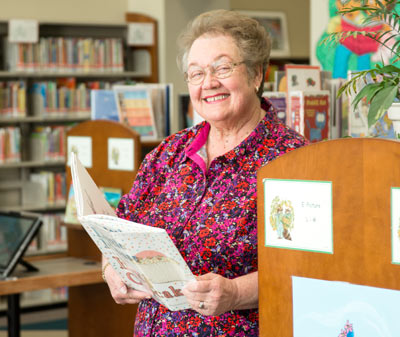
“The kids need to know where to find wonderful stories, and the library is that place.”
Books offer a magical escape that every child should experience, and Sandy DeParsqual loves to make that happen.
Born and raised in Omaha, Nebraska, Sandy moved to Florida in 1964 with her husband, Vincent. They relocated to Ocala 10 years ago. A preschool teacher for almost 23 years, Sandy spent a career working with 2, 3 and 4 year olds.
“After I retired, I missed working with the children, so I volunteered with the Marion County Health Department and began reading stories in the pediatric department once a week,” says Sandy, 71. “After I had a battle with cancer a few years ago (She beat it!), my primary physician said I had a suppressed immune system as a result of the treatments and that I shouldn’t be around sick kids at the health department.”
Determined to find a way to continue to combine her passion of reading and children, Sandy discovered the Library Express program at the Marion County Public Library. Launched in 2009, the program was developed to offer story time experiences and quality literature to at-risk children in Head Start classrooms across the county.
Sandy volunteered shortly after the program started and has been involved ever since. She’s assigned a specific school each school year and makes arrangements with the director of that Head Start program as to when she will come read.
“The Library Express program supplies us with a packet of all the materials you need to present a preschool circle time, such as stories, songs, puppetry, flannel graph, action nursery rhymes, basically anything that promotes reading and language development,” notes Sandy, who prepares carefully before her presentations. “Everything you need is in the packet, but do I practice? You’d better believe it!”
Because of the children’s ages, story time usually lasts no longer than 15 to 20 minutes. Sandy typically reads to two different classes in one day.
One of the program’s goals is to expose children to the joy of reading, so when a teacher asked Sandy to bring in library card applications, she happily passed them out to the children.
“A couple weeks later when I came to that class, one little girl ran up, threw her arms around me, and told me, ‘Miss Sandy, I went to the ‘liberry!’ She was absolutely thrilled,” recalls Sandy. “The kids need to know where to find these wonderful stories, and the library is that place.”
Whether she’s using songs, puppets or other materials, Sandy always appreciates that special moment when the children truly connect with the story.
“The best part is the magic twinkle that comes in their eyes when I read the stories,” she says. “I have a grown son and daughter but no grandkids, so this helps fill the gap. It’s something that my soul really longs for, and I love it.”
Lynda Pender
“I love children, and sometimes they’re in situations that break your heart. You just want to do everything you can to help them.”
Lynda Pender, 68, is a North Carolina native who has been a certified Guardian ad Litem volunteer in Marion County since 2009.
“I love children, and sometimes they’re in situations that break your heart,” she says. “You just want to do everything you can to help them.”
Lynda and her husband, Brooks, moved to Miami in 1963. They relocated to Ocala in 1972 but spent six years in Polk County in the 2000s because of Brooks’ job. After her husband’s passing in 2007, Lynda returned to Ocala.
The mother of three grown daughters, Lynda has six grandchildren and six great-grandchildren, and she has a tender heart when it comes to the needs and emotions of children. She first learned about the Guardian ad Litem (GAL) program back in 1989, but at the time, she had her hands full raising her own girls and caring for her elderly mother. Twenty years later, she finally had the opportunity to attend the training program and become a GAL volunteer.
These volunteers are appointed by the courts to advocate for children who have often been removed from their homes due to alleged abuse, abandonment or neglect and find themselves as part of a dependency court proceeding. There are currently about 550 Marion County children in these situations, many of whom are younger than age 8.
“Parents have lawyers, but we are the voice for the children; we speak for them,” explains Lynda, who, at press time, was assigned to 10 cases and 14 children.
Depending on what is happening with her cases, Lynda puts in an average of 20 hours per week doing her visits, writing reports and going to court and mediation when necessary.
“The kids aren’t always removed from their homes, but in many cases, they are. Sometimes they’re lucky enough to end up with a grandparent or other relative; others end up in licensed foster care,” says Lynda, who sees each of “her” children at least once a month and often more frequently.
As a GAL volunteer, Lynda works as part of a team with a volunteer supervisor and a program attorney. Her responsibility is to become familiar with each assigned child and that child’s particular case so she can make recommendations to the court as to what would be in the child’s best interest for a “safe, caring, stable and permanent environment.”
“Sometimes it’s very frustrating, such as when parents don’t do what they need to do to rectify a situation,” says Lynda. “Children love their parents, no matter what, and it can be heart wrenching when a child wants to go home, but that’s impossible. It’s also hard when I see a child who, for whatever reason, has a hard time finding an adoptive home or permanent guardianship situation. Some are in the foster system until they age out and don’t have a forever family.”
Despite the challenges, Lynda loves what she does.
“I’ve had several cases where I’ve become friends with and am still in regular touch with the children and their parents (or grandparents) years after the case was closed. That’s rewarding and makes me feel like I’ve made a difference.”
Want To Help?
The organizations mentioned in the story are always open for more volunteers. Contact them directly if you want to help make a difference in a child’s life.
Arnette House
(352) 622-6135
Big Brothers Big Sisters of Mid-Florida
(352) 375-2525
Boys & Girls Club of Marion County
(352) 690-7440
Guardian ad Litem Program
(352) 671-5757
(352) 274-5231
Lynn.Sennett@gal.fl.gov
Marion County Public Library “Library Express” Program
(352) 671-8551






